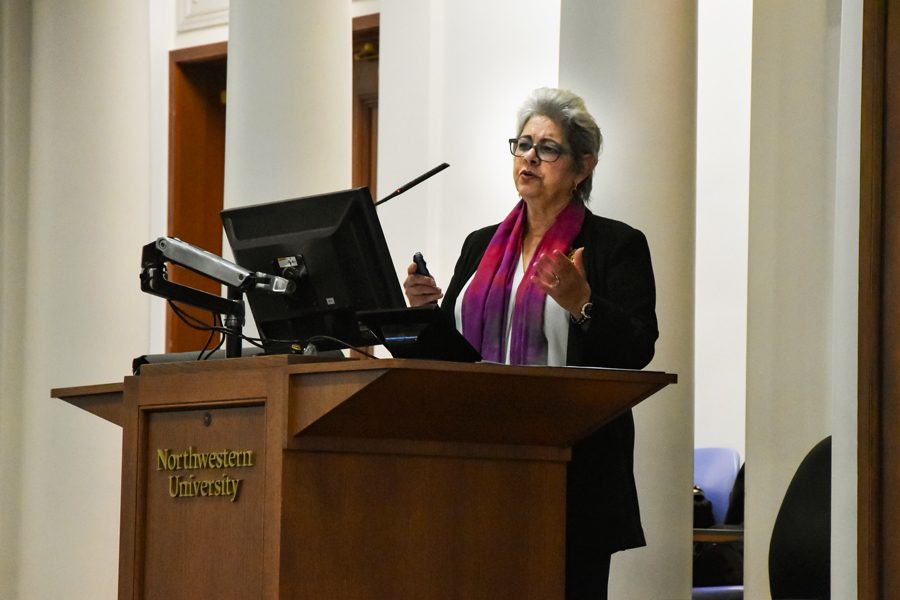Yolanda Flores Niemann urges equitable tenure-track for women of color at Women’s Center keynote event
Brian Meng/Daily Senior Staffer
The Women’s Center keynote speaker Yolanda Flores Niemann spoke on Thursday in Harris Hall. Niemann urged allies to support equitable tenure-track policies for women of color.
October 24, 2019
Yolanda Flores Niemann, a psychology professor at the University of North Texas, urged allies to support faculty who are women of color by advocating for equitable tenure-track policies.
Niemann spoke on Thursday in Harris Hall as this year’s Women’s Center keynote speaker. The Latina and Latino studies program and One Book One Northwestern also co-sponsored her event. In front of a crowd of about 35 people and a live stream to Northwestern’s Chicago campus, she said tokenism and service work prevent underrepresented women academics from earning tenure.
Seventy-one percent of full-time faculty in degree-granting postsecondary institutions are white. The few women of color who earn tenured positions are often tokenized, leading to a sense of “disrupted identity,” Niemann said.
“Faculty of color enter their positions as colleagues, scholars and experts in their field,” she said. “But their distinctive identity quickly shifts to being the black person, the brown person, the Asian or Native American faculty member. Their racial identity becomes the lens through which they are perceived.”
Niemann said these faculty members are often “talked into” unpaid service work: serving on diversity committees, mentoring students and chairing search committees. Because it’s difficult for these faculty members to participate in “time-consuming” service work while conducting research, they have to make a choice: fail to earn tenure or sacrifice their physical and mental health by taking on extra tasks.
Niemann is a University of North Texas psychology professor and editor of “Presumed Incompetent: The Intersections of Race and Class for Women in Academia,” a 2012 collection that illuminates the challenges women of color encounter in academia. A new version, “Presumed Incompetent II,” will be released spring 2020.
Assistant Provost for Diversity and Inclusion Mónica Russel y Rodrígue and Women’s Center Director Sekile Nzinga-Johnson introduced Niemann. Nzinga-Johnson said Niemann’s message underscores the Center’s current programming, “By Degrees: Gender. Education. And Progress,” which acknowledges Northwestern’s 150-year anniversary of admitting women while recognizing the identities of non-binary women.
“As we think about the gender expansion of Northwestern and what that means, what’s been the progress, what’s been the roadblocks, what’s work that can still be done?” Nzinga-Johnson said.
Women academics who are pregnant, as well as those who report instances of sexual assault, often receive negative faculty evaluations. Combined with the strain of tokenism for women of color, this treatment can lead to burnout, workplace tension and pressure to assimilate to white, upper-class standards of professionalism. Niemann said support groups are integral for faculty of women of color.
This message resonated with Multicultural Student Affairs Director Daviree Velázquez Phillip, who said she often feels “spread too thin.”
“For those of us who are called to do this work — that work being serve students, fight for justice — we must take care of ourselves, we must surround ourselves with systems of care,” Velázquez said.
Niemann said that faculty who are women of color shouldn’t bear the entire burden of advocating for increased representation. She added that appointing more women deans, provosts and presidents, as well as reexamining tenure-track policies, can break down barriers in academia.
A person-centered approach that emphasizes support systems can bolster representation, she said.
“We need to examine existing policies and ways that they can be more humanized,” she said. “We don’t want to say scholarship is not important. It is important. But can we do it in a humanizing way?”
Email: [email protected]
Twitter: @herscowitz












